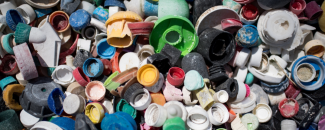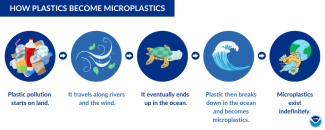Geneva based non-profit organization supports Marine Microplastics database expansion

NOAA’s National Centers for Environmental Information (NCEI) and non-profit organization Oceaneye have created a partnership to improve and expand the Marine Microplastics database. The objective of this partnership is to not only expand the database, but to also establish a diverse international community of public users.
Oceaneye is a Geneva-based organization that focuses on citizen science initiatives to raise awareness about plastic pollution in the ocean—microplastics, along with larger plastic debris, are a threat to human health, marine ecosystems, and the economy, among other things.
Marine Microplastics Explained
Marine microplastics are less than 5 mm—smaller than a sesame seed. Single-use plastic like bottles and plastic bags, along with longer-term plastics like cosmetic items, eventually become part of oceanic pollution. Microplastics are also hidden in everyday items. Dubbed “microbeads”, this microplastic can be found in exfoliants and even toothpaste, which then pass through filtration systems and into our waterways.
Plastic waste is generated from manufacturers. While we can't control what manufacturers produce, we can change the resources we buy and reduce the waste that moves towards the ocean.
See How Plastics Become Microplastics
Much of the globe consumes seafood as a source of protein. However, microplastics threaten this sustainable food source. According to the International Journal of Environmental Medicine and Human Health, microplastics can even cause harm to a fetus—scientists are studying the possible presence of microplastics in human placentas and the long-term impact this may have on human health.
With further research, scientists can gauge how microplastics impact human health, fishing industries, and our marine ecosystems so that we can combat microplastic pollution.
Oceaneye Citizen Science
Oceaneye’s non-profit organization has 16 volunteer sailboats that collect microplastic data to gather and analyze in their lab. With this partnership, NCEI’s Marine Microplastics database has the potential to continue expanding as global data are analyzed and organized.
Oceaneye is becoming a part of the vast network of 30+ providers supplying marine microplastics data to NCEI. However, their contributions aren’t a drop in the bucket. Oceaneye is one of the primary marine microplastic data collectors in and around Europe—combined with NCEI’s Marine Microplastics database, this partnership significantly improves the range of scientific data.
Learn about NOAA’s ongoing collaborations on the NOAA Technology Partnerships Office website. Their mission is to “serve NOAA and the U.S. economy by transferring NOAA’s scientific and technological innovations.”




